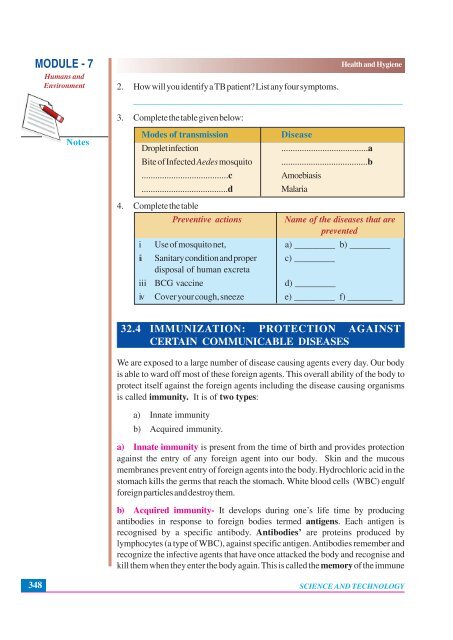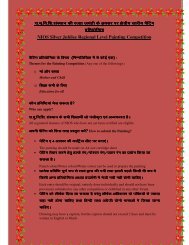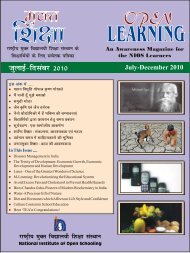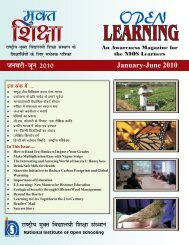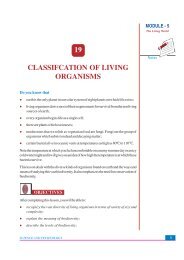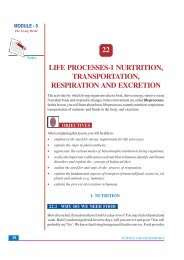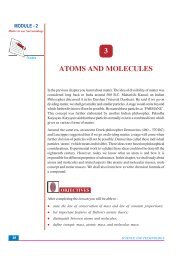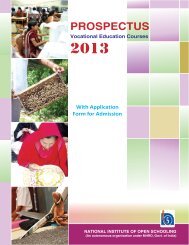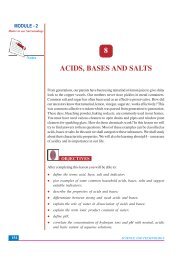32. Health and Hygiene - The National Institute of Open Schooling
32. Health and Hygiene - The National Institute of Open Schooling
32. Health and Hygiene - The National Institute of Open Schooling
Create successful ePaper yourself
Turn your PDF publications into a flip-book with our unique Google optimized e-Paper software.
MODULE - 7<br />
Humans <strong>and</strong><br />
Environment<br />
Notes<br />
2. How will you identify a TB patient? List any four symptoms.<br />
<strong>Health</strong> <strong>and</strong> <strong>Hygiene</strong><br />
___________________________________________________________<br />
3. Complete the table given below:<br />
Modes <strong>of</strong> transmission<br />
Droplet infection<br />
Bite <strong>of</strong> Infected Aedes mosquito<br />
......................................c<br />
......................................d<br />
4. Complete the table<br />
Preventive actions<br />
Disease<br />
......................................a<br />
......................................b<br />
Amoebiasis<br />
Malaria<br />
Name <strong>of</strong> the diseases that are<br />
prevented<br />
i Use <strong>of</strong> mosquito net, a) _________ b) _________<br />
i Sanitary condition <strong>and</strong> proper c) _________<br />
disposal <strong>of</strong> human excreta<br />
iii BCG vaccine d) _________<br />
iv Cover your cough, sneeze e) _________ f) __________<br />
<strong>32.</strong>4 IMMUNIZATION: PROTECTION AGAINST<br />
CERTAIN COMMUNICABLE DISEASES<br />
We are exposed to a large number <strong>of</strong> disease causing agents every day. Our body<br />
is able to ward <strong>of</strong>f most <strong>of</strong> these foreign agents. This overall ability <strong>of</strong> the body to<br />
protect itself against the foreign agents including the disease causing organisms<br />
is called immunity. It is <strong>of</strong> two types:<br />
a) Innate immunity<br />
b) Acquired immunity.<br />
a) Innate immunity is present from the time <strong>of</strong> birth <strong>and</strong> provides protection<br />
against the entry <strong>of</strong> any foreign agent into our body. Skin <strong>and</strong> the mucous<br />
membranes prevent entry <strong>of</strong> foreign agents into the body. Hydrochloric acid in the<br />
stomach kills the germs that reach the stomach. White blood cells (WBC) engulf<br />
foreign particles <strong>and</strong> destroy them.<br />
b) Acquired immunity- It develops during one’s life time by producing<br />
antibodies in response to foreign bodies termed antigens. Each antigen is<br />
recognised by a specific antibody. Antibodies’ are proteins produced by<br />
lymphocytes (a type <strong>of</strong> WBC), against specific antigen. Antibodies remember <strong>and</strong><br />
recognize the infective agents that have once attacked the body <strong>and</strong> recognise <strong>and</strong><br />
kill them when they enter the body again. This is called the memory <strong>of</strong> the immune<br />
348<br />
SCIENCE AND TECHNOLOGY


